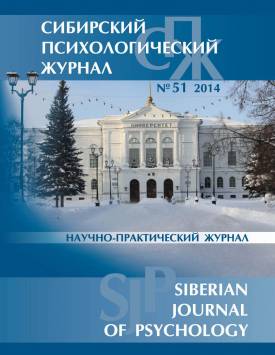Epistemological possibilities of transspective analysis
In article methodological problems of modern psychology in a context of becoming of a humanitarian paradigm and nonclassical type of rationality are investigated. The article shows that the historical approaches to the logic of linear time impede critical reflection on the process of scientific knowledge of human. The author speaks of the need of a specific algorithm, a holistic understanding of the human phenomenon and considers the method of transspective analysis (V.E. Klochko) as an algorithm. Nonclassical transspective discourse emphasizes nonlinear deterministic process systemically self-complication psychology and directs it to the principle of self-reflection nonidentical subject himself. Transspective relieses psychological knowledge from plants paradigmatic historical time, and the effect of reverse perspective allows to discover new, more significant meaning and psychological research findings of the past. Such an interpretation of the scientific experience of the past in a contemporary style rationality holds in transformations object not so much temporal context as subject. The author emphasizes that in the non-classical paradigm case study due to human values and semantic dimensions of his being. Therefore, it is important cultural context of psychological research in which historical time and methodological space, bound together and which forms chronotop psychological knowledge. Today it is clear that the topology of methodological space of psychology is a kind of network. But its complexity is due to the implicit ontological assumptions - the personal sense of the researcher. Because the network methodology has no solid reason, the object can be described in many ways and becomes the basis of his understanding is knowledge relatedness. Appeal to context is a characteristic of non-classical knowledge. Information openness and contextuality of transspective as deconstruction, actualize the future in the present and the past and discovers the meaning of substantive transformation of psychology as an inner tendency of its development. In synergy systemic unity of past, present and future is described through the concept of an attractor (the formalization of the concept of "desire", which defines the trend of development). Transspective reveals anthropologization trend as a natural complication of psychology. And the continuity of its subject as regards the transformation process of the formation of the current object. Therefore transspec-tive analysis may constitute a means of meta-analysis of scientific formation of psychology.
Keywords
антропологизация, онтологизация, трансспектива, тенденция, становление, хронотоп, деконструкция, реконструкция, актуальная предметность, аттрактор, anthropologization, ontologisation, transspective, trend, chronotop, attractor, becoming, decon-struction, reconstruction , actual objectivityAuthors
| Name | Organization | |
| Chermenskya Galina G. | Tomsk State University | ggchtomsk@mail.ru |
References

Epistemological possibilities of transspective analysis | Sibirskiy Psikhologicheskiy Zhurnal – Siberian Journal of Psychology. 2014. № 51.
